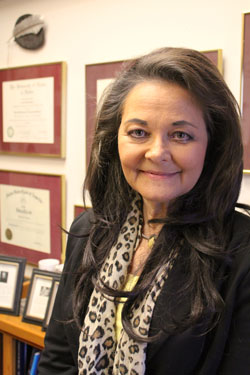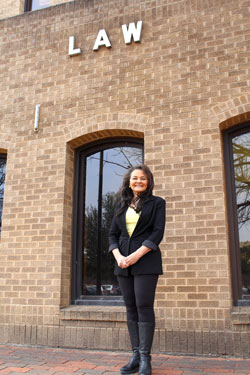News and Events
Horn Professor's Research Puts Texas Tech School of Law Ahead of the Game
By Lucy Worley, Marketing & PR Coordinator
Online learning is taking the world of higher education by storm. Globalization and emerging technology continue to set a stage where students want to change the way they learn without it interrupting the way they live.
For many, this means online classes.
This rising trend is often met with skepticism in fields of study such as medicine, engineering and law, all of which are arguably harder to teach online compared to subjects more philosophical in nature. It's one thing to share ideas online, it's another to teach face-to-face skills.
Associate Dean for Research and Faculty Development at the Texas Tech University School of Law, Dr. Victoria Sutton, however, wanted to know if teaching a sociable subject such as law could be done online.
A pioneer and progressive thinker, Dr. Sutton is no novice to thinking outside the box. Nationally recognized for her work in biodefense, biosecurity and bioterrorism, Dr. Sutton served as a political appointee for President George W. Bush as the Chief Counsel for the Research and Innovative Technology Administration from 2005 until 2007.
Along with a distinguished background in teaching and research, Dr. Sutton has received many honors over the course of her career. Awarded the university-wide President's Book Award for her groundbreaking casebook Law and Science: Cases and Materials, she has also been named a Paul Whitfield Horn Professor, a high honor amongst faculty at Texas Tech.
Even with those and many other accomplishments under her belt, Dr. Sutton is always on the lookout for a new challenge. So in 2015, she launched Texas Tech University School of Law's first online course to see what would happen.
"Simulating a law class online is really hard, but it's a healthy move to be more practical. I felt this was something that was coming, despite there being fairly wide pushback from other law schools," Dr. Sutton said.
Dr. Sutton decided to teach an emerging technologies law class as her first trial run – a fitting course for her experiment of sorts. To summarize the findings of the class, Dr. Sutton published an academic paper entitled, "Asynchronous, E-learning in Legal Education: A Comparative Study".
"There is just a very small number of asynchronous law e-learning courses available to study, and there is additional work required to do it properly. So in deciding whether to plunge into the asynchronous law teaching domain, without such evidence, it seemed inevitable that I should develop a comparative study and make a contribution to this need for the legal academy."
That she did.
Dr. Sutton proceeded to not only teach the emerging technologies course, but additionally used the experience to measure the efficacy of a fully online law course.
The objectives going into the course were to first, create a law course noticeably different from traditional ones. Next, she wanted to develop more points of contact with students through online methods than they might have through drop-in visits in a regular class. The third goal was to simulate the Socratic method effectively in an online forum. The last goal was to test as many American Bar Association (ABA) Standards as she could with the course (Sutton).
Dr. Sutton was surprised by the findings when she surveyed the students at the end of the fall semester.
"There was a question I asked that prompted the students to compare this online course with their experiences in a traditional law course. Most students were just as satisfied," Dr. Sutton said.
"Another surprising finding was their response to an answer about the quality of interaction between them and myself, the professor. All of our interaction was online and yet a significant percentage of the class ranked the interaction just as good, or even of excellent quality," Dr. Sutton said.
Granted, Dr. Sutton realized that students enrolled in an emerging technologies law class might be a skewed group to survey about online learning. However, since that semester, she has put a total of five law classes either fully or partly online, most all yielding positive results.
"Some of my other classes such as cybersecurity law, I have taught as hybrid courses – partially online but also with some classroom interaction," Dr. Sutton said.
"Part of law school is socializing people into the profession of law. How do you act as a lawyer? How do you represent clients? It's certain things you cannot teach online, so this hybrid model, I am finding, might be the best of both worlds."
She is probably correct in that assumption. Dr. Sutton had some of the same students who took emerging technologies go ahead and also take cybersecurity, to compare the two experiences. When surveyed, the majority of the students preferred the hybrid experience.
What does this mean for the future of law school?
"There is a lot of tradition surrounding the teaching of law. Starting with the Harvard style method, which is very theoretical. But now ABA is pushing for a more practical style of learning, moving away from this older tradition. The pendulum is swinging, and we're all trying to see where it will go," Dr. Sutton said.
As she continues to tweak her course delivery, she truly has discovered that an online learning is not only feasible for law, but can actually be successful. An outcome many leaders in this field thought impossible.
Dr. Sutton's research, curiosity and drive has put the Texas Tech School of Law ahead of the game, once again proving that from here, it's possible.
Dr. Sutton presented this paper at the annual law school conference, the American Association of Law Schools, in San Diego Jan 3-6, 2018, on a panel for the Associate Deans.
References:
Dr. Victoria Sutton, Asynchronous, E-Learning in Legal Education: A Comparative Study. Retrieved 12/1/2017 from https://papers.ssrn.com/sol3/papers.cfm?abstract_id=2819034.

 Victoria Sutton, MPA, PhD, JD
Victoria Sutton, MPA, PhD, JDPaul Whitfield Horn Professor
Associate Dean for Research and
Faculty Development
eLearning & Academic Partnerships
-
Address
Texas Tech Plaza | 1901 University Avenue, Suite 513 | Lubbock, Texas 79410-5095 || Mailing: Box 45095 | Lubbock, TX 79409-5095 -
Phone
Office (806) 742-5944 || Student Support (806) 853-5153 or toll-free (844) 897-0537 -
Email
online@ttu.edu
